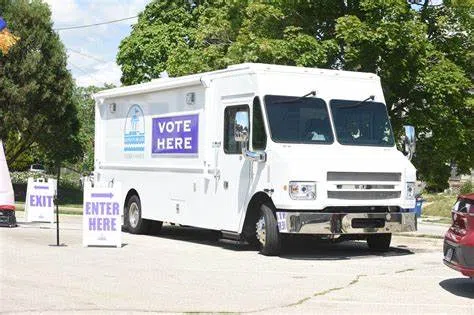
Racine Mobile Voting Van - Photo by Journal Times' Ryan Patterson
MADISON, WI (WSAU)—On Tuesday morning, the Wisconsin Supreme Court voted 4-3 to overturn a lower court ruling that banned the use of mobile voting sites in the state.
According to the Associated Press, the high court ruled that the plaintiff, Racine County Republican Chairman Ken Brown, was not sufficiently “aggrieved” under Wisconsin law and therefore lacked legal standing to sue over the van’s use in 2022.
The van, which was funded in part by a $328 million donation from the Center for Tech and Civic Life, which Facebook CEO and co-founder Mark Zuckerberg founded, was used by the city during the 2022 election to collect early ballots in mostly Democrat strongholds as they sought to turn out a higher rate of low propensity voters in the city. A constitutional amendment to ban the use of out-of-state money otherwise known as “Zuckerbucks” in Wisconsin elections was passed by voters in 2024.
Racine County Circuit Judge Eugene Gasiorkiewicz ruled in January of 2024 that “nowhere can this Court find or has been provided any authority allowing the use of a van or vehicle as an alternate absentee voting vehicle.” Judge Gasiorkiewicz refused the defense’s argument that the use of the van was permitted due to there being no state-specific law that banned mobile voting sites due to Wisconsin having a law that bans the use of early voting sites in locations that gives an advantage to any political party.
The Supreme Court’s dissent was written by Justice Rebecca Bradley, who said Wisconsin voters were deprived of the substitutive ruling on the matter, saying, “The people are left, once again, without a decision on fundamental issues of election law enacted to protect their sacred right to vote.”
“The majority, once again, refashions the law to its own liking as it shuts the doors of the courthouse to voters,” Bradley continued.
This decision by the Supreme Court comes just months after it determined in June that the lower court’s ruling prohibiting the use of mobile voting sites was adequate to remain in effect throughout the 2024 presidential election.







Comments